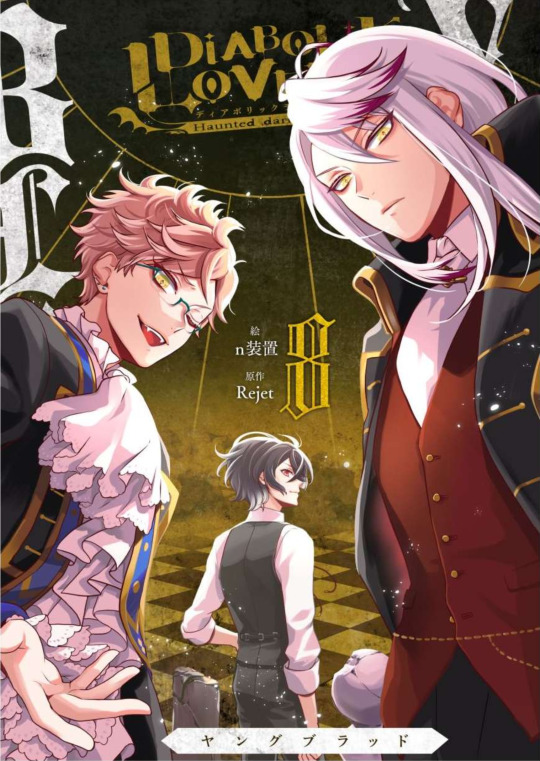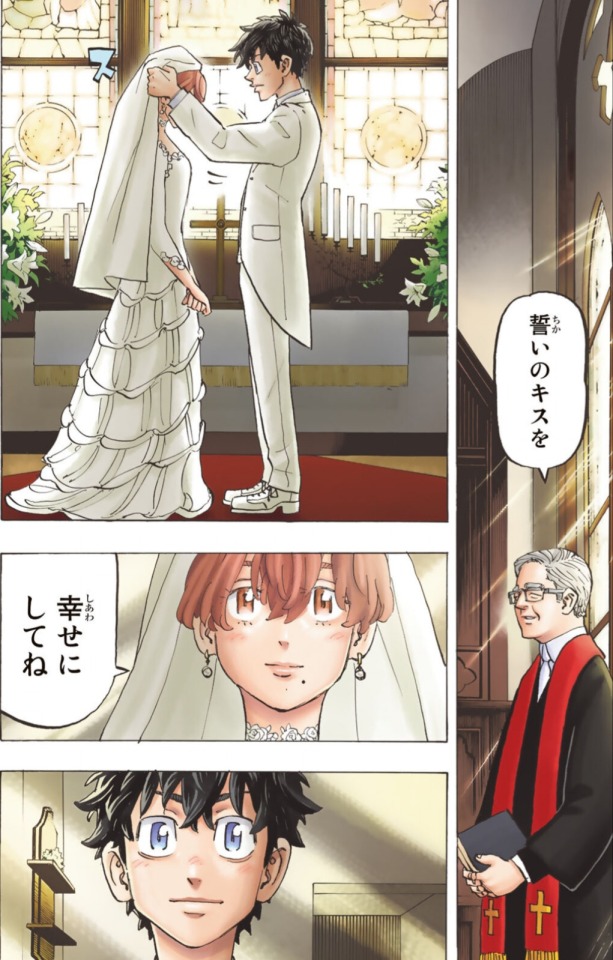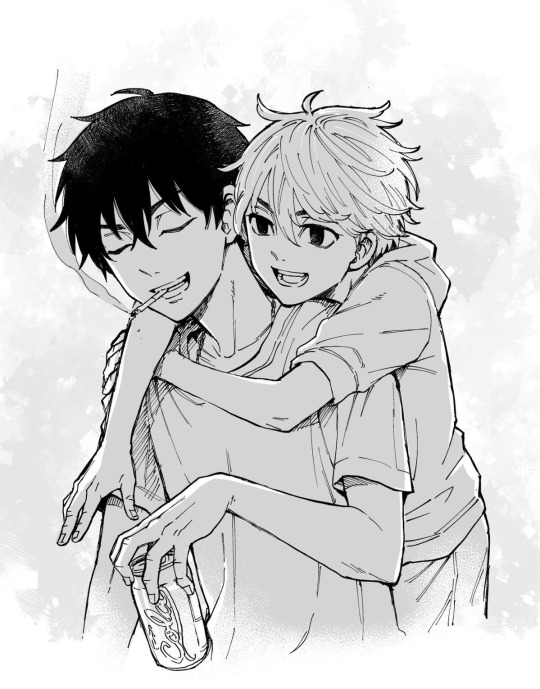I am 19 years old. Pronouns: she/her. I want this doggie in the photo.
Don't wanna be here? Send us removal request.
Text

Another finished commission! ✨
One of my favorite things to draw is OC x Canon, it really makes me very happy to do this type of content for my clients 💖
If you're interested in a commission, feel free to DM me anytime!
Reblogs are highly appreciated!
8 notes
·
View notes
Text
DIABOLIK LOVERS YOUNG BLOOD - Chapter 8 (English Translation)

Ava: Woa~h, finally we get a new manga chapter! This also marks the final addition to the Young Blood series!! Sorry I got to it a little late than usual but I hope you enjoy. The cover is a little deceiving since it doesn’t actually show Kino or the Tsukinami’s, but it’s quite conclusion to an interesting manga concept, nonetheless!
Huge thank you to @edicionesew for their scans of the original manga pages! You can also purchase the original manga here. ^^
CHECK OUT MY TRANSLATION HERE!
414 notes
·
View notes
Note
What if MC was dating Damon and/or DG and some random tough guy claims MC belongs to him and him alone. What would Damon and DG do?

That tough guy will be dead.
1K notes
·
View notes
Note
This has gotten me emotional y'all :(
So, I wanted to see what you thought about one specific scene in "Prince of Egypt" (Great movie btw) When Moses starts sobbing after seeing that his brother's son is dead, and the Pharaoh finally let the Hebrews go. It totally caught me off guard, but it speaks a lot about how much he didn't want any of that horrible stuff to happen. What do you think?
This movie is one of my all-time favorites. It makes me want to scream, cry, and dance around in circles because it is such a beautifully done work of art.
The scene where Moses starts crying and falls to his knees is so powerful. And it says so much about what he has suffered through for so long. This moment is the culmination of so many things, from the final release of his people… to the brokenness of his Egyptian family… to the emotional trauma of having fought for freedom for many decades.
Sympathy of a Brother

Moses and Rameses grew up as brothers - brothers who did a whole lot together. Basically, everything together, from what we can see. Moses always managed to drag Rameses into pranks and all sorts of ridiculous misadventures, and when their father called them down for it, Moses always sought to vouch for his brother’s case. When Rameses received a promotion, the first thing he did was promote Moses in turn. Even when Moses killed a man, which was punishable by Egyptian law, Rameses wanted to keep his brother close. These two were incredibly emotionally close growing up, brothers who were simultaneously best friends.
Then Moses disappeared. Biblically, he disappeared for forty stinking years. The movie does not depict him staying away that long, but you still see Zipporah’s sisters growing up, Moses’ hair growing out, and life passing considerably before he returns to Egypt.
The reunion between the brothers is at first happy. They are glad and excited to see each other, marveling at how much has changed and how they have grown over time. Rameses is flabbergasted to see Moses dressed in Midian attire, while Moses marvels that his brother has stepped up as Pharaoh. This is an important, emotional, wonderful family reunion from them at the start, and we can see that Rameses and Moses still care significantly about each other even after the long years apart.

Regrettably, the cheerful reunion ends. Moses’ adamant refrain to let his people go angers Rameses - for understandable reason - but that is the topic of another analysis. The point of the matter is, even though Rameses becomes infuriated, he still cares about his brother. And his brother, as much as it pains him to get on the Pharaoh’s bad side, would much emotionally prefer to laugh happily alongside him.
In fact, in the midst of the ninth plague, after Egypt has essentially been decimated by the horrors of Yahweh, Moses and Rameses are still able to share some tender brotherly moments together.
It is during the ninth plague, the plague of darkness. Rameses is sitting up on a statue he has used since a young man as a refuge. He sits up there to get away from life’s troubles and reflect. Moses finds him there and remarks on how many memories he has of this place. The two of them then enter a period of nostalgia, reminiscing together of the past, and you can feel the fact that, even though they are at current odds, they still both care about one another. Even in the midst of Egypt being torn apart, even in the midst of Rameses’ heart being hardened against the Lord, they still are able to think back on when times were great between them.
In their hearts, both brothers still want that.
Now think about the moment that Moses cries at the end of the tenth plague. He is mourning the fact that Egypt has been destroyed and that his brother’s heart has been shattered in the process. He hates how much pain his brother is going through right now. In fact, when Moses see Rameses mourning the loss of his son, he tries to reach out to his brother’s shoulder. Moses’ first instinct is not to tell Rameses, “See? I told you more misery was coming. How about you just let the Hebrews go now?” Instead, his first instinct is to reach out sympathetically, mournfully, to try to comfort his grieving brother.
Rameses wrenches away. He finds Moses the cause of it and cannot stand to have the man indirectly behind this premature death touch him. He shouts at Moses to leave.
And Moses, feeling horrible about what his brother has gone through, falls down to weep.
Knowledge of the Upcoming

There is even more playing into Moses’ tears. For he knew what was coming before the tenth plague passed and killed all the firstborn children in the city.
God told Moses how to prevent the angel of death from killing the firstborn children of the Hebrews. The blood of the lamb on the doorposts would prevent the Hebrews’ firstborn children from dying. This means Moses knew in advance that the Egyptian boys were going to die. Including his nephew. And it is very obvious he has this knowledge. During the plague of darkness, Moses makes it very clear he feared for his nephew’s life.
Moses brings this up first by telling the Pharaoh, “Rameses, your stubbornness is bringing this misery upon Egypt. It would cease if only you would let the Hebrews go.” Moses hates seeing Egypt in pain. This is his home, after all! He is watching the commoners of Egypt, the nobility, and all the people with whom he grew up suffer under traumatic plagues. Moses might be God’s spokesman, standing as the human representative during the ten plagues, but he wants these nightmares stopped just as much as Rameses. “This was my home,” he sings during “The Plagues.” “All this pain and devastation - how it tortures me inside! All the innocent who suffer from your stubbornness and pride.”
I believe Moses understands why Rameses is so angry and hardened against him. Rameses feels the pressure of being a great ruler. He also feels like Moses is betraying him by coming home years and years later… only to try to take away one of his sources of power. It really hurts Rameses inside that his brother would do that. He feels like his brother has come, turned around, and started to hate him for no reason. But even though Moses understands and sympathizes Rameses’ anger and obstinance, he just begs his brother to let go of his pride so that this misery can end.
Because Moses also knows more misery is coming. And once Rameses ignores Moses’ first subtle warning in the plague of darkness scene, Moses gets more blunt. “Something else is coming,” he warns Rameses. This is someone who desperately wants Rameses to avoid more pain! Moses pleas, “Something much worse than anything before. Please, let go of your contempt for life… before it destroys everything you hold dear. Think of your son!”
Moses is basically handing it to Rameses. He is warning his brother that this little boy is in danger. He is telling Rameses what the next plague is going to do! And he does not want it to happen. He has seen Rameses holding onto the boy, laughing with him, comforting him. Moses would feel horrible beyond belief for taking that away from the Pharaoh. Consequently, he tries his very best to convince Rameses to back down before the plague can strike and take this boy away.
Unfortunately, Rameses does not understand the warning. He responds angrily to Moses, happy nostalgia time over, “My father had the right idea about how to deal with your people, and I think it’s time I finished the job. And there shall be a great cry in all of Egypt… such as never has been or ever will be again!”
That has got to be a horrible blow for Moses emotionally. Rameses is right that there will be a great cry in all of Egypt… it just won’t be the Hebrew people crying. The angel of death is going to come and make all the Egyptians scream out for the deaths of their firstborns.
But Moses realizes Rameses will not listen. He knows what is going to happen, but he cannot stop God. With great pain, he concludes, “Rameses, you bring this upon yourself.”
And yet Moses cries horribly once Rameses’ son is dead. I am sure that Moses still feels more than a little responsible for what has happened. Rameses might have been stubborn and refusing to release the Hebrews, but Moses was the one in the first place who came with God and the plagues. Had situations played out differently, Moses might have watched his nephew grow up in prosper… rather than be the one with God bringing forth the very boy’s death.
Moses is crying because he has brought death to his old family’s household.
Back in a Full Circle

There is one more thing that makes this moment so completely horrible for Moses. Not only does he feel somewhat responsible for the boy’s death. Not only does he feel the pain of having known what would happen beforehand and not being able to prevent it. Not only does he wish he could have a solid family with his Egyptian brother. But on top of all that, he feels the pain of a cycle coming around again.
Moses’ life amongst the Egyptians began during an infanticide.
Moses’ life amongst the Egyptians ends during a second genocide.
Moses’ foster father, the old Pharaoh of Egypt, ordered a widespread slaughter of Hebrew infants. Moses was spared because the Pharaoh’s wife discovered the baby Moses in the basket. This genocide came back to haunt Moses many years later. When he learned of what his foster father had done, he was terrified, and this knowledge was one of the key factors which caused him to run away to Midian and leave his life as a prince of Egypt. The death of all the Hebrew babies Moses considered an unforgivably despicable thing, so despicable he could no longer associated with the Egyptians he once considered family.
Now Moses is standing alongside God as his very deity does the same thing Pharaoh did decades ago: kill innocent children. God has the authority and the justice to give life and take it away, but that does not make it any easier for a human like Moses to stomach.
Moses in fact even sees Rameses refuse to back down in front of the mural depicting the Hebrew babies’ death. He is being visibly reminded that the Egyptian kids will go through a slaughter just like is happening on the wall.
He sees history repeating.
He sees Rameses pointing an order, just like his father.

Simultaneously he sees Rameses’ son standing beneath the mural’s dying babies. Moses sees his nephew standing near the crocodiles, looking like just another one of the kids who died in that day.

And Moses knows that the boy will indeed die like this tomorrow. The horrific painting on the wall will again become tragic reality.
Moses falls down to his knees and cries after seeing his dead nephew because of all the painful flashbacks it brings. The deaths of Hebrew babies should have been avoidable back when he was an infant. And the deaths of all the Egyptian firstborns in turn should have been preventable also.
And even though Moses tried, he tried to stop it, he had to witness a second genocide which occurred within his lifetime. Life came back in a full circle with the death of more innocents.
And with it, all emotions come crashing down on Moses. He feels the weight of the firstborns’ deaths on his shoulders. He feels the weight of his nephew’s death in particular. He feels the anger of his brother - the brother he wished could have been his continuing best friend. And I believe that the entire weight of the whole slavery ordeal comes crashing down on Moses at this moment when he cries. For Moses’ entire life, slavery has been an issue. And he has gone through a very long, very painful journey trying to end this. Now, the pain of all the plagues crash down on him now that all the plagues are done. He feels the weight of what he has done freeing all the Hebrews. The trials are over… and now that they are over, he can feel, feel, feel the pressure of what it has been to suffer this long ordeal.
I fully believe the plagues were traumatic to Moses. I believe that both from a biblical standpoint and from the narrative of DreamWorks’ “The Prince of Egypt.” Moses followed Yahweh’s command and obediently stood up to Pharaoh, telling him to let the Hebrews leave Egypt. But he hated seeing the plagues destroy his very home, his very childhood, his very family. As you say, Moses’ tears really speak to how much he did not want the plagues to befall his old home.
275 notes
·
View notes
Note
Gnome, a question, in your point of view, which of the psychopathic brothers (and that's what I call Alan and his brothers) is the insane one and the worst in the yandere category? And why?
May i introduce you to the unfinished Orion brothers yandere scale


775 notes
·
View notes
Text
So cyuuttttte

i lieeeeeeddd im a fucking liaaaaarrrrr i did a lil gif instead…….
me n meat as lin & ren :3
YES i know its shitty but i dont CAAAAAAREUUUUUHHH im in pain leave me alone NJDNCKDNKVF
24 notes
·
View notes
Text
Give me my mansszzzz!
Them giving you random kisses ♡

857 notes
·
View notes
Text
OMG I want this for my first date at a bootiful aquarium!

taiju commission 🦈💙
62 notes
·
View notes
Note
My favorite thing about Chifuyu is the way he tried to beat that guy up in school
When he headbutted him while pretending to bow respectfully??? That was definitely so cool of him, love the way he grins after too


91 notes
·
View notes
Text
Love the difference in the Haitani brother's here. You've got Rindou being careful and making sure rascal is supported while running meanwhile Ran is just running while rascal tries to not fly off. (Also rip Ran's hat)

358 notes
·
View notes







